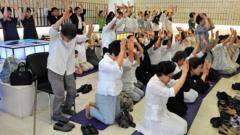The Unification Church, often referred to as the “Moonies”, has been a fixture in Japan since the 1960s. Recently, a Tokyo district court ordered the church’s disbandment after claims of coercion and financial exploitation of its followers emerged during investigations connected to the killing of former prime minister Shinzo Abe in 2022. The alleged assassin cited personal grievances against Abe due to the politician's association with the church, expressing a belief that it had financially ruined his family.
The Japanese education and culture ministry had sought the church's dissolution, accusing it of pressuring followers into making substantial financial contributions. Although the church maintains that these donations are part of legitimate religious practices, it is now facing significant changes. The court’s ruling will strip the church of its tax-exempt status and compel it to liquidate its assets, although it will still have the ability to operate in the country and may appeal the decision.
Authorities, during their investigation, uncovered evidence suggesting that the church manipulated followers by instilling fears regarding their spiritual health, leading them to make large purchases. Testimonies from almost 200 individuals alleging victimization by the church helped underscore the need for action. Furthermore, since the start of 2023, about 200 former members have filed claims for financial compensation totaling approximately 5.7 billion yen (about $38.5 million), as revealed by their legal representatives.
The Unification Church's connections to Japan's ruling Liberal Democratic Party (LDP) have sparked national outrage, particularly following Abe's assassination. Investigations disclosed that a significant number of LDP officials had interactions with the church, including attending events and receiving financial support. The fallout from these revelations has led to the resignation of four ministers and raised pressing questions about the relationship between politics and religious organizations in Japan.
As the implications of the ruling and the church’s practices continue to reverberate through Japanese society, a conversation surrounding the intersection of faith, exploitation, and political ties remains vital.
The Japanese education and culture ministry had sought the church's dissolution, accusing it of pressuring followers into making substantial financial contributions. Although the church maintains that these donations are part of legitimate religious practices, it is now facing significant changes. The court’s ruling will strip the church of its tax-exempt status and compel it to liquidate its assets, although it will still have the ability to operate in the country and may appeal the decision.
Authorities, during their investigation, uncovered evidence suggesting that the church manipulated followers by instilling fears regarding their spiritual health, leading them to make large purchases. Testimonies from almost 200 individuals alleging victimization by the church helped underscore the need for action. Furthermore, since the start of 2023, about 200 former members have filed claims for financial compensation totaling approximately 5.7 billion yen (about $38.5 million), as revealed by their legal representatives.
The Unification Church's connections to Japan's ruling Liberal Democratic Party (LDP) have sparked national outrage, particularly following Abe's assassination. Investigations disclosed that a significant number of LDP officials had interactions with the church, including attending events and receiving financial support. The fallout from these revelations has led to the resignation of four ministers and raised pressing questions about the relationship between politics and religious organizations in Japan.
As the implications of the ruling and the church’s practices continue to reverberate through Japanese society, a conversation surrounding the intersection of faith, exploitation, and political ties remains vital.





















